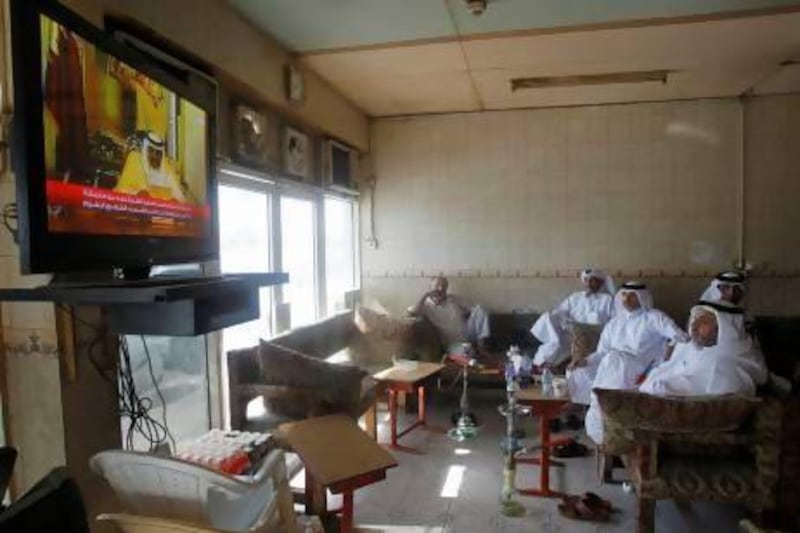DOHA // Sheikh Tamim bin Hamad Al Thani is the new emir of Qatar, after his father abdicated the throne yesterday morning.
In a seven-minute speech, the outgoing emir, Sheikh Hamad bin Khalifa Al Thani, said he was passing power to his son and to Qatar's next generation, which he described as "the munitions of this homeland".
"Time has come to turn a new leaf in the history of our nation, where a new generation steps forward to shoulder the responsibility with their dynamic potential and creative thoughts," the 61-year old emir said, seated in his diwan.
"As I address you today, I declare that I will hand over the reins of power to Sheikh Tamim bin Hamad Al Thani and I am fully certain that he is up to the responsibility."
Sheikh Tamim, a 33-year-old military officer, will now lead a country that, despite its small size, has become the world's largest exporter of liquefied natural gas and a key broker in international financial markets through its sovereign wealth fund of more than Dh 367billion.
His youth has been broadly welcomed by Qatar, which has a decidedly young population; about half of the country's 250,000 citizens are under the age of 20. Most of Qatar's 1.9 million people are expatriate workers.
The transfer of power "is a great sign that Qatar believes in the youth, both in the Royal family and in the society", said Reem Harmi, a Qatari writer.
Immediately after his father's speech, Sheikh Tamim was expected to begin a two-day process of consultations with families and tribes, and any Qatari citizens who wished to visit the diwan "to swear allegiance to HH Sheikh Tamim as Emir of Qatar", yesterday morning and afternoon and this morning, the Qatar state news agency reported.
State television showed Qataris streaming in to greet the new emir, who held a receiving line with his father throughout the morning in a large open area in the diwan, flanked by Qatari flags.
Possibly today or later this week, Sheikh Tamim is expected to announce a new government, including ministerial posts and also the new heir apparent, who would take over as emir in the event that Sheikh Tamim could not continue in the role. Among the changes expected is the stepping down of the prime minister and foreign minister, Sheikh Hamad bin Jassim Al Thani, who has been the public face of Qatar's growing influence for the past half a decade.
CNN Arabic reported yesterday, citing highly placed sources, that the new emir's first move may be to increase salaries by 10 per cent for all Qataris.
Bestowing power on his son, Sheikh Hamad reflected on his 18 years of rule. He said he had not "desired power for the sake of power, nor endeavoured to rule for personal motives" but for "the nation's interest; and that interest has dictated that we lead through a new chapter".
Sheikh Hamad, who took power in a bloodless coup in 1995, said he was placing faith in the country's younger generation more broadly by transferring power to his son.
He urged the new leadership to "seek knowledge" and "let hard work be your habit in serving your country, steering away from complacency or reluctance or acceptance of existing state of affairs".
"I am sad the emir has stepped down, as he has done great things for our country," said a 24-year-old Qatari engineer, Mohammed, reacting to the emir's speech. "But I am confident in a bright future under our new leader."
The Qatari broadcaster Al Jazeera, which first announced the transition would begin on Monday, said it expected many of the ministers in the new government to reflect this generational shift.
"Starting with Sheikh Tamim, Qatar is undergoing a wider familial succession to a younger generation of leaders," Sheikh Salman, head of the Brookings Doha Centre, wrote yesterday. "Many of these new figures have grown up with the new emir and have been groomed accordingly for their new roles."
Few analysts expect major policy shifts in the immediate term.
But the symbolic impact of the transfer of power is already apparent, said Abdullah Baabood, head of the Gulf studies programme at Qatar University.
"One of the issues that always threatens the stability of Gulf states is succession, and in many cases it hasn't been resolved, he said. "Now we have a new precedent."
Yesterday was declared a national holiday in Qatar to mark the transition of power, and Qataris were glued to their TVs throughout the morning to watch the speech, leaving the streets deserted.
edickinson@thenational.ae
twitter: For breaking news from the Gulf, the Middle East and around the globe follow The National World. Follow us
Qatar succession: Seven minutes when power changed hands
How the man who ruled Qatar for 18 years gave way to a new generation. Elizabeth Dickinson reports from Doha

Editor's picks
More from the national




